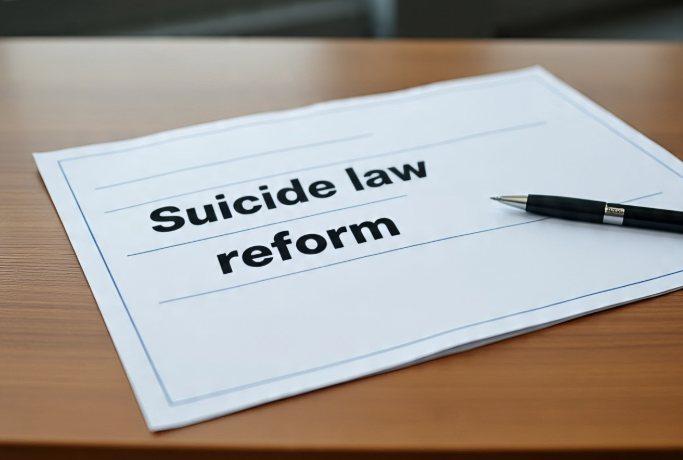Photo credit: Meta AI
BY HARUNA YAHAYA POLOMA
In a confounding display of bureaucratic cynicism, the government has announced December 2025 as the target date to decriminalise attempted suicide in Nigeria. This is a move that represents an ultimate surrender to the catastrophic failure to protect citizens from the unimaginable suffering and misery that are confronting them.
Rather than addressing the root causes of despair that lead many to attempted suicides, such as the crushing poverty, systemic corruption, and institutional neglect that continuously push millions to the brink of unaliving themselves, this administration seeks to remove legal consequences for those who choose to escape their misery through suicide. This is not compassion; it is state-sanctioned abandonment of a population drowning in hopelessness.
Moreover, the timing of this proposed reform is particularly grotesque. With Nigeria ranking as the seventh-highest country globally in suicide rates and recording approximately 15,000 suicide deaths annually, the government’s decision to focus on decriminalisation rather than intensifying poverty alleviation and mental health infrastructure development reveals a disturbing choice in priorities. When a state faces an epidemic of despair among its citizens, the moral response should be to address the sources of that despair, not to effectively make recourse to suicide more accessible by removing the legal barriers.
Advertisement
Across the world, progressive nations treat suicide as a public health crisis, not merely a legal issue. The World Health Organisation recognises suicide as a global health emergency, with over 720,000 lives lost annually to suicide worldwide.
In high-income countries, the decriminalisation of suicide has historically been accompanied by robust mental health support systems, crisis intervention networks, and substantial public funding for suicide prevention programs. These nations came to understand that decriminalisation alone is hollow and meaningless without parallel investments in mental healthcare and social safety nets.
Nigeria’s belated approach stands in shameful contrast to this global standard. What our government is proposing is to remove punitive measures, while offering little or no substantive replacement in terms of mental health support. The existing mental healthcare infrastructure remains grossly underfunded, inaccessible to most citizens, and largely stigmatised even within the medical establishment itself. This reform, therefore, represents a hollow form of progress; a mere legalistic change without material improvement in the conditions that initially drive people to suicide.
Advertisement
To properly understand the unconscionable cruelty of this effort at decriminalisation of suicide, one must revisit the underlying socio-economic nightmare fuelling Nigeria’s suicide crisis and the deliberate societal apathy that continuously enables this national tragedy. The levels of unemployment, food insecurity, malnutrition, violence, terrorism, banditry, kidnapping and corruption alone paint a compelling picture of a nation in profound distress.
These are not natural disasters; they are direct consequences of concomitant policy choices and governance failures. The same government that now seeks to decriminalize suicide has presided over the economic devastation that is driving citizens to despair. The bitter irony is that the state, which has failed in its fundamental duty to protect the well-being and welfare of citizens, now magnanimously offers them the perverse “right” or option to kill themselves without legal consequence.
The human cost of these failures by the state can be measured in acts of desperation: men drinking pesticide after losing their livelihoods, students jumping from heights after academic frustrations, and mothers poisoning themselves because they cannot feed their children. These are not criminal acts to be sanctioned; they are the final, desperate protestations against unbearable conditions of existence in a nation that has abandoned its people.
We submit that this decriminalization effort must be recognised for what it truly is: a calculated diversion to distract public attention from the breathtaking failure to address the root causes of Nigeria’s suicide crisis. Instead of creating jobs, it offers the right to die without criminal penalty. Instead of ensuring food security, it offers freedom from prosecution for those who choose a terminal escape from hunger. Instead of providing healthcare, it offers legal immunity for those driven to final acts of desperation arising from unaddressed trauma and mental anguish.
Advertisement
The cruel hypocrisy of this approach is stunning. While Professor Muhammad Ali Pate, the minister of health and social welfare, speaks of “changing the narrative on suicide”, the government he serves is presiding over the harshest living conditions in national memory, which not only create suicide desperation but make it a viable alternative for many Nigerians. His ministry speaks of “creating hope through action”, but is offering the hopelessness of dying without legal consequence.
This is not and cannot be compassion. It is the ultimate expression of cynicism. It demonstrates a government that has not only given up on its people but is now offering them the “freedom” to give up on themselves. The Nigerian people deserve much more than the right to die without criminal penalty. They deserve the right to live with dignity, security, and hope.
They deserve a government that fights for their lives rather than merely enabling them to die without consequence. True compassion is a government that addresses the crushing poverty and suffering that are now making death seem more preferable to life for so many Nigerians.
Haruna Yahaya Poloma can be contacted via [email protected]
Advertisement
Views expressed by contributors are strictly personal and not of TheCable.











